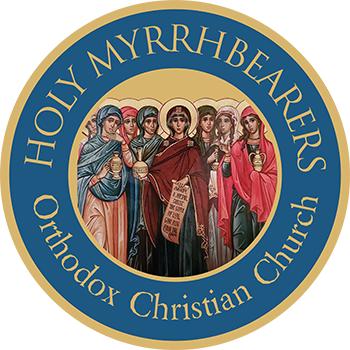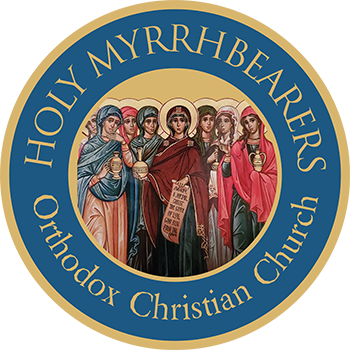February 11, 2024

Thy will be done! Really? Are you sure?
As we reflect upon the Gentile women in Matthew 15:22 this morning, what stood out to me was that the Cananæan women asked the Alpha and the Omega for mercy. She did not offer a wish list and name all the calamities she was attached to, but simply asked for mercy. “O woman, great is thy faith! [Mt. 15:28] Sometimes our distrust in God’s timing consumes us and we abandon this type of faith displayed in the Gospel reading this morning.
The true Church teaches us that God is not the author of evil. In the beginning, death and suffering were not present in Eden, there was no cancer or any type of illness or disease. As Christians we do not believe that Evil is something in and of itself. Evil is not a created force or entity. As St Basil tells us, “…Evil is not a living and animated substance, but a condition of the soul which is opposed to virtue… [St Basil the Great – Hexaemeron, Homily 2:4-5] Evil is essentially nothing because it is the absence of, or the twisting of God’s Energies. The easiest way to think of evil is to liken it to darkness, which has no properties and cannot be measured or even created. You can remove light from a room, but you can’t add darkness to a room. Darkness is not a thing, it is a word we have created to describe the absence of another thing, such as light. So, evil is not a thing, it has no measurable properties. It is the word that we humans have created to try to describe the absence of God’s Energies when we can feel they are missing.
The Philokalia quotes St. Diadochus of Photiki: “Evil does not exist by nature, nor is any man naturally evil, for God made nothing that was not good. When in the desire of his heart someone conceives and gives form to what in reality has no existence, then what he desires begins to exist. We should therefore turn our attention away from the inclination of evil temptations and concentrate it on the remembrance of God; for good, which exists by nature, and it is much more powerful than our inclination to evil. The one has existence while the other does not, except of course when we give it existence through our actions.” Archbishop Kallistos Ware states it in this Orthodox Way: “Evil is the twisting of what is in itself good. Evil resides not in the thing itself, but in our attitude toward the thing – that is to say, in our will.”
God created us with free will, which in turn allows us to twist and distort that which was intended for good. By definition, free-will has no restrictions; otherwise it wouldn’t be free will. So, we all have absolute freedom to choose! We are its master! St. Columbanos, a flaming red-haired Irish abbot from Leinster writes: “Many lose their true home because they have greater love for the road that takes them there. Let us not love the road rather than our home… Let us keep to this principle, therefore, that we should live as travelers and pilgrims on the road… free of lusts and earthly desires, but let us fill our mind with heavenly and spiritual forms.” (St. Columbanos)
Our suffering comes from the fall of mankind. St. Athanasius says: “For bringing them [humanity] into His own paradise, He gave them a law, so that if they guarded the grace and remained good, they might have the life of paradise—without sorrow, pain, or care—besides having the promise of their incorruptibility in heaven; but if they were to transgress and turning away become wicked, they would know themselves enduring the corruption of death according to nature, and no longer live in paradise, but thereafter dying outside of it, would remain in death and in corruption.” [St Athanasius – On the Incarnation 3]
We recognize three types of suffering in this world: we suffer from the persecution of others in body and soul, we suffer from sickness and disease, and we suffer in spirit because of the sinfulness of our fallen world. We can chose to transform them into a way of salvation for ourselves, or we can except defeat with rebellion and denial, and then just as Job’s wife suggests “curse God and die” both physically and for eternity both now and ever and unto the ages of ages. (Job 2.9–10). Job’s sufferings were from a test of his faith and not from his sins.
St Makarios of Egypt says this about our suffering: “However great the afflictions we suffer, what are they compared with the promised future reward, or with the grace of the Holy Spirit that visits souls even in this present life, or with the deliverance that we have received from the obscurity of evil passions, or with the enormous debts we owe because of our sins? As St. Paul tells us: ‘The sufferings of this present life are not worthy to be compared with the glory which shall be revealed in us.’ (Romans 8:18) Hence, we must patiently endure everything for the Lord’s sake, like brave soldiers dying for our King.” [St. Makarios of Egypt – The Philokalia Vol. 3]
The Wisdom of Solomon records: “God did not make death, and He does not delight in the death of the living; for He created all things so that they might exist; the creatures of the world are wholesome, and there is no destructive poison in them”. (Wisdom of Solomon 1:13-14)
Saint Maximus the Confessor taught that only God is free from suffering, according to His nature: “Nothing that has come into being or created is free of suffering…only what is unique, infinite and uncircumscribed, [which only describes God] is free of suffering” (De Ambigua 7). The very fact that something is created means it is capable of experiencing change, for better or for worse. Saint Irenaeus of Lyon believed that the original humans were neither mortal nor immortal. They were created by God with a potential to move in either direction; but their rejection of God aligned them with the fluctuating world rather than the absolute God.
For that reason, our suffering and death are not intended by God. We suffer because of our existence in a fallen world, one in which our fore fathers chose. And yet here we are in February 2024, still making the same choices! The Psalmist writes: “For those blessed by Him shall inherit the earth, but those cursed by Him shall be cut off” (37:22). Since the beginning of the Church, suffering has often been understood in one of these two ways: either as punishment by God (an opportunity for repentance), or as chastening from God (an opportunity for spiritual growth). Suffering can be a natural response to our actions (touching a hot stove or choosing a sinful act), defying the laws of nature and even Divine intervention.
Suffering is here to stay, or at least on this rocky road. But what will we decide do with it? Even our Lord took on flesh and suffered and died. He didn’t choose sin, and He didn’t deny God, but suffered. But then He transformed His death by trampling down death by His death for our salvation!
God does not demand that you obey but allows you to choose, but there are natural consequences when we deny the created laws. But our Creator simply wishes salvation for us all. And salvation comes from prayer and repentance. St. Paul in his suffering stated his trust in God in this way: “And we know that all things work together for good to those who love God, to those who are the called according to His purpose.” (Romans 8:28) Our time on this rough road is drawing near. Do you trust our Father enough to say: Thy will be done? Or as Fr. Richard Reed like to say: “Glory to God!” Or as the monks in Optina monastery pray: “Teach me to treat all that comes to me with peace of soul, and with the firm conviction that Thy will governs all.” (Morning Prayer of the monks of the Optino monastery)
Fr. Gabriel Weller 2-11-2024
Comments will be approved before showing up.

